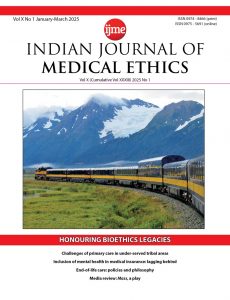
Today, long established human rights are being demolished worldwide, with no safe place left. This makes it even more essential for ethics to be the lodestar guiding one’s path, especially in healthcare, where lives are at stake. In India, the late Sunil K Pandya, our Founder Editor, was an individual who followed this staunchly. An editorial reflects on his role in the struggling bioethics movement in the country. Another protests the blatant discrimination by some leading Indian doctors against Bangladeshi patients, in the guise of ‘nationalism’.
Insurance companies in India are resisting the inclusion of mental healthcare in medical insurance. A research article examines insurance policy documents for compliance with this reform. Another article explores whether ancient DNA research is permissible in the absence of informed consent from descendant communities.
An Ayurveda article published in IJME two years ago continues to trigger strong responses. One response argues that the Hindu knowledge system and Ayurveda must be approached from a qualia-centric perspective; while two others argue that this approach is hollow and flawed.
Two authors suggest using creative modes such as poetry and movies to educate medical students more effectively. A case study and a commentary describe the complex ethical challenges of treating patients in remote tribal communities.
Besides Sunil Pandya, we have lost two other stalwarts in 2024 — Richard Cash, a public health pioneer, long-time editorial board member and supporter of IJME, and Anita Ghai, a disability rights activist. We honour their achievements in this issue.
__________________________________________________________________________________________________________Cover credit: Whittier to Talkeetna by Alaska Railways, photographed by Sunil K Pandya, courtesy Shubhada Pandya.
